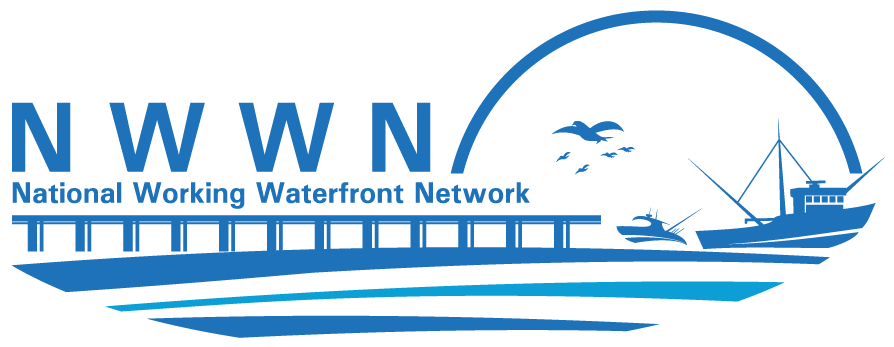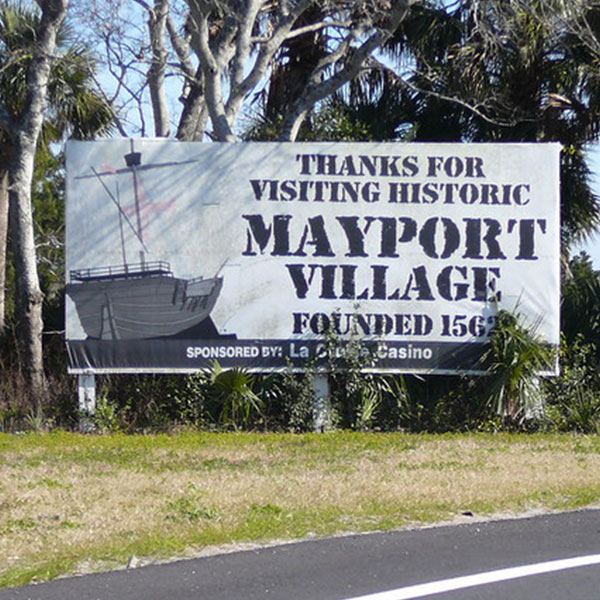Case Study
Mayport Village Case Study: Using Litigation to Protect a Historic Florida Fishing Village from a Proposed Cruise Ship Terminal
Location
Mayport Village, Jacksonville, Duval County, Florida (northeast Florida)
Timeframe
2008 – present
Summary
Mayport Village is a historic coastal community designated as “Florida working waterfront” by the State of Florida Waterfronts Florida Program (an entity that provides communities with planning assistance for revitalization of their waterfront areas). Located east of Jacksonville, FL, the community has long supported a small fishing and shrimping industry. In 2008, the Jacksonville Port Authority, Jaxport, purchased an 8-acre parcel in Mayport Village as the future site of a $60 million cruise ship terminal. To accommodate the project, Jaxport sought to rezone the tract via a large-scale comprehensive plan amendment. However, a civic association and a group of residents brought suit seeking an injunction to block efforts to rezone the proposed site. In addition to citing a number of issues like increases in pollution and traffic, the lawsuit included the claim that Jaxport’s conduct during the purchase of the 8-acre parcel violated Florida’s “Sunshine Law,” the common name of Florida’s law that provides a basic right of public access to the meetings of government bodies. The lawsuit also includes the claim that the zoning designation sought by Jaxport contradicts the goals of the Waterfronts Florida Program.
Although the rezoning request was withdrawn in 2009 due to the global economic downturn, litigation continues as it relates to potential Sunshine Law violations. Also, as the withdrawal of the rezoning request is temporary and Jaxport maintains ownership of the 8-acre parcel, the threat of future attempts to rezone and develop the parcel into a cruise ship terminal remains.
Transferability
Transferability partially depends on the nature of both growth management legislation and the land use regulations of other jurisdictions. However, the case study illustrates the potential effectiveness of land use planning for working waterfronts, forming partnerships, and using litigation.
Best Practices
- Emphasize policies that protect and encourage small-scale industrial interests within working waterfronts.
- Develop partnerships among diverse interests.
- Use litigation to stall conflicting land uses proposed for working waterfront land.
Full Case Study Description
Background
Mayport Village is a community on Florida’s east coast that is designated a Florida working waterfront pursuant to the State of Florida’s Waterfronts Florida Program. This designation has allowed Mayport Village to receive assistance from the state to plan for revitalization efforts in its waterfront area, and as a result the community has a special zoning overlay designed to protect the historic character of its working waterfront. Although now annexed to Jacksonville, a relatively isolated location has also helped preserve the historic character of the community, which has long supported a small fishing and shrimping industry. Yet, despite the working waterfront designation and the unique historic qualities of the community, the Jacksonville Port Authority, Jaxport, purchased an 8-acre parcel in Mayport Village in 2008 as the future site of a $60 million cruise ship terminal. In order to accommodate the project, Jaxport needed a rezoning of the tract and sought approval from the City Council of Jacksonville. Jaxport sought a change in zoning from a Community General Commercial land use to a water-dependent, water-related land use. Due to the fact that Florida’s Growth Management Act requires consistency of zoning regulations with comprehensive plans, Jaxport requested that the City Council amend the City’s comprehensive plan.
Challenges/Issues, Actions, & Approaches
Citing the historic and cultural values of the area, an increase in pollution and traffic, loss of community character, and the struggling shrimping industry, residents and organizations in the community opposed the cruise ship terminal. The Mayport Civic Association (represented by the Public Trust Environmental Legal Institute of Florida) and a handful of residents filed a lawsuit to challenge the proposed cruise ship terminal and the associated comprehensive plan amendments. The lawsuit primarily alleges that Jaxport violated Florida’s “Sunshine Law” – Florida’s public access law that provides a basic right of access by the public to the meetings of government bodies – because it failed to provide proper notice of meetings during which Jaxport and the City made decisions that related to the purchase of the 8-acre parcel of land. The suit also alleges that the land use designation sought by Jaxport was incompatible with both the intent and goals of the Mayport Village Working Waterfront Zoning District and the original mission of the Working Waterfronts Program (citing Florida Statute 342.07(2), which excludes “seaports” from the definition of “recreational and commercial working waterfront”.) Also, although it refrained from joining the lawsuit, Mayport Waterfront Partnership (MWP), a partnership representing the interests of multiple government agencies, businesses, and community members, and overseeing the redevelopment and revitalization of several coastal areas in and around Jacksonville, officially opposed a cruise ship terminal at Mayport Village. In contrast to supporting a cruise ship terminal, MWP supports the revitalization of the ecotourism and shrimping industries in the area.
Next Steps
The project was temporarily shelved in 2009 following the economic downturn. The City and Jaxport withdrew the pending ordinances and, in 2010, Jaxport officially announced it would be considering other possible locations for the cruise terminal. However, the threat of future attempts to rezone and develop the 8-acre parcel into a cruise ship terminal remains a reality for a variety of reasons: 1) the withdrawal of the rezoning request is temporary; 2) Jaxport maintains ownership of the 8-acre parcel; and 3) Jaxport has not foreclosed the potential to again seek to build a terminal on the parcel. Also, although the pending ordinances were withdrawn, the Sunshine Law violations remain and litigation is ongoing.
Key Partners
Mayport Civic Association Mayport Waterfront Partnership Public Trust Environmental Legal Institute http://www.publictrustlaw.org
Contacts
Sam Floyd, Chairman of Mayport Waterfront Partnership, email: doodlebugshrimp@aol.com
Andrew Miller, Public Trust, Environmental Legal Institute of Florida, website: http://www.publictrustlaw.org/, email: adm@publictrustlaw.org
Additional Information
- City of Jacksonville’s Mayport Waterfront Partnership: http://www.coj.net/departments/planning-and-development/community-planning-division/mayport-waterfront-partnership.aspx
- Save Mayport Fishing Village: http://www.savemayportvillage.net
- Waterfronts Florida Program: http://www.floridajobs.org/community-planning-and-development/programs/technical-assistance/community-resiliency/waterfronts-florida-program
- Waterfronts Florida Program, Mayport Village: http://www.floridajobs.org/community-planning-and-development/programs/technical-assistance/community-resiliency/waterfronts-florida-program/mayport-village
- Waterfronts Florida Program Case Study: http://www2.vims.edu/bridge/wateraccess/case_study.cfm?ID=34
References
City of Jacksonville ordinance declaring that Mayport Village is “a unique and invaluable resource to the City and its citizens and should be preserved for future generations”: City of Jacksonville Ordinance 2001-910, Sec. 656.395(b).
Mayport Village Waterfront Zoning District (Legislative findings and intent): City of Jacksonville Ordinance 2001-910, Sec. 656.395.
Legislative Authorization of Florida’s Working Waterfront Program: Florida Statute § 342.201 (2012).
Statutory Definition of “recreational and commercial working waterfronts”: Florida Statute § 342.07(2) (2012).
Last updated 25-Mar-13


